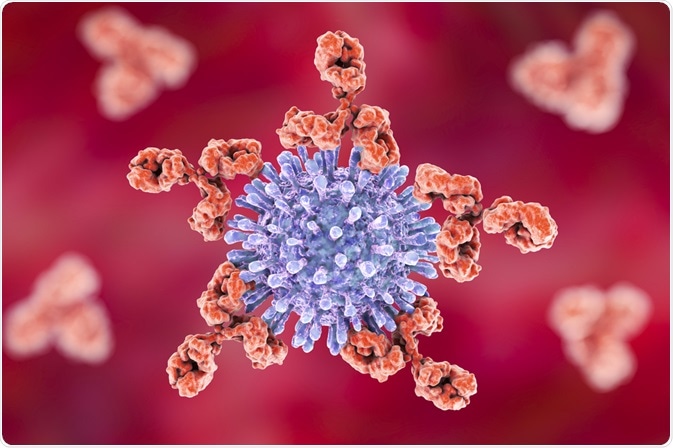Monoclonal antibodies represent identical immunoglobulins that are generated from a single parent immune B cell. Rabbit monoclonal antibodies refer to antibodies that have been developed in rabbits rather than mice, which are most commonly used to generate antibodies.
 Image Credit: Kateryna Kon/Shutterstock.com
Image Credit: Kateryna Kon/Shutterstock.com
Why is there a need for rabbit monoclonal antibodies?
Rabbits offer a unique advantage over mice for the production of monoclonal antibodies as they are capable of producing a large variety of B cells and therefore antibody structures. In addition, the rabbit immune system can produce antibodies with a 10-100 times higher affinity for the target antigen, compared to mouse monoclonal antibodies.
Reduced background noise
Rabbit antibodies can only detect a single epitope, thus, the possibility of cross-reactivity with other proteins is low. It has also been observed that rabbit antibodies can bind with greater affinity to the target antigen, leading to a greater signal-to-noise ratio for rabbit antibodies compared to mouse antibodies. Thus, RabMabs generate a more specific and sensitive image – particularly in cases of high background noise.
Increased specificity and high affinity
Mouse antibodies are highly specific; however, they cannot detect minor changes in epitopes or different versions of a protein. Rabbit antibodies, however, are highly specific and detect even cleaved versions of the target protein.
The presence of an antibody with high affinity can ensure that even in conditions of high stringency, high signal strength can be achieved. This leads to clean images with high specificity and low background effects.
Antibody affinity can be measured using equilibrium dissociation constant (KD), where KD= koff/kon between the antigen and antibody. Low KD values describe a high affinity between the antigen and antibody.
The values of most monoclonal antibodies lie in the range of nanomolar (KD = 10-9 M); however, the KD value of rabbit monoclonal antibody can be in the picomolar range (i.e. KD = 10-12 M), suggesting a high degree of affinity.
For example, the affinity value of rabbit antibody against endoplasmic reticulum is 1.28 X 10-12 M, while the mouse antibody against endoplasmic reticulum is 5 X 10-9 M. Similarly, the affinity values for rabbit and mouse antibody against TNF-alpha are 1.25 X 10-11 and 2 X 10-10 M.
Suitability for immunohistochemistry
As rabbit monoclonal antibodies offer high sensitivity with very low loss of specificity, they represent an ideal choice for applications such as immunohistochemistry performed on formalin-fixed paraffin-embedded FPPE tissues.
Working dilutions are often higher for rabbit monoclonal antibodies, and can be employed in a wide variety of fixation procedures. New rabbit antibodies are often tested on human lymphoid or lymphoma tissue microarray that is constructed with FPPE tissue to observe stain quality.
Rabbit antibodies for detecting post-translational modifications
Due to the distinct immune system of rabbits, they have the capacity to develop antibodies even against small epitopes that are present in small molecules, lipids, and polymers. Thus, they can detect subtle changes that occur during post-translational modifications or single amino acid substitutions.
Accordingly, rabbit antibodies can provide high affinity and specificity to detect the target, and can be used to recognize modifications, such as phosphorylation, methylation, acetylation, sumoylation, etc. Many of the antibodies that are raised in mice do not detect such modifications.
Cancer therapy
In 1986, the FDA approved the first monoclonal antibody with a clinical application; preventing acute organ rejection after transplantation. This led to a rise in monoclonal antibody development for cancer therapy. Initially, these antibodies were mouse-based and offered less diverse responses. Rabbit monoclonal antibodies are now being explored as they can provide an alternative source of therapy that is more specific and is less expensive.
Further Reading